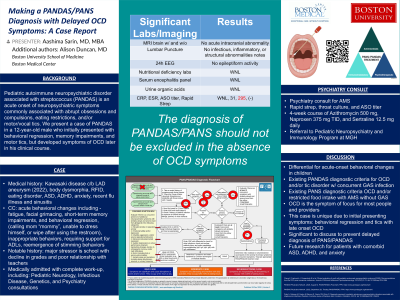Neurocognitive Disorders and Neuropsychiatry
(094) Making a PANDAS/PANS Diagnosis with Delayed OCD Symptoms: A Case Report


Aashima Sarin, MD, MBA (she/her/hers)
Resident
Boston University Medical Center
Boston, Massachusetts
Alison Duncan, MD
Assistant Professor
Boston University Chobanian and Avedisian School of Medicine
Boston, Massachusetts
Presenting Author(s)
Co-Author(s)
Background/Significance: Pediatric autoimmune neuropsychiatric disorder associated with streptococcus (PANDAS) is defined by an acute onset of neuropsychiatric symptoms commonly associated with abrupt obsessions and compulsions, restrictive eating, and/or motor/vocal tics in the context of group A streptococcal infection (GAS). We present a case of PANDAS in a 12-year-old male who initially presented with behavioral regression, memory impairments, and motor tics, but developed symptoms of OCD later in his clinical course.
Case: PM is a 12-year-old male with a history of autism spectrum disorder (ASD), ADHD, anxiety, and recent flu illness who presented to the emergency department with acute behavioral changes. Parents noted odd behaviors including fatigue, motor tics, memory impairments, and behavioral regression (calling mom “mommy”, unable to dress himself, or wipe after using the restroom). The patient was admitted to the inpatient pediatric service and received a complete medical and neurological work-up due to the broad differential. Psychiatry was consulted for altered mental status as suspicion for organic causes was decreasing. Given the recent history of upper respiratory symptoms and suspicion for PANDAS: rapid strep test, throat culture, and an anti-streptolysin O (ASO) titer were obtained. ASO titer was elevated, and the patient was started on a four-week course of 500mg of azithromycin daily, a four-week course of naproxen 375mg three times a day, and 12mg of sertraline daily. The patient was discharged home with close follow-up with Psychiatry and Psychology. Symptoms improved after treatment was initiated.
Discussion: When a child presents with acute-onset behavioral change, the differential is broad and requires a multidisciplinary evaluation spanning pediatric specialties (Chang et. al, 2015). The existing literature suggests that PANDAS is diagnosed with a history of acute-onset OCD and/or tic disorder in the pediatric age range, followed by a concurrent diagnosis of a GAS infection, whereas PANS is the acute onset of OCD and/or restricted food intake followed by acute neuropsychiatric symptoms, without a GAS infection (Prato et. al, 2021). The association is strongest with OCD and several provider and layperson guides focus primarily on the acute presentation of OCD. This case is unique in that the predominant presenting symptoms were behavioral regression and tic disorder — followed later by OCD symptoms. While acute-onset OCD is the most common indicator of PANDAS/PANS, discounting a presentation that does not initially include acute-onset OCD can delay diagnosis and treatment. Additionally, this disease process warrants further evaluation and research in the population of children with a prior diagnosis of ASD as symptoms of ASD and the comorbidities can overlap with symptoms of PANDAS/PANS.
References:
Chang K, Frankovich J, Cooperstock M, et al. Clinical evaluation of youth with pediatric acute-onset neuropsychiatric syndrome (PANS): Recommendations from the 2013 pans consensus conference. Journal of Child and Adolescent Psychopharmacology. 2015;25(1):3-13. doi:10.1089/cap.2014.0084
Prato A, Gulisano M, Scerbo M, Barone R, Vicario CM, Rizzo R. Diagnostic approach to pediatric autoimmune neuropsychiatric disorders associated with streptococcal infections (Pandas): A narrative review of literature data. Frontiers in Pediatrics. 2021;9. doi:10.3389/fped.2021.746639
Presentation Eligibility: Not previously published or presented.
Diversity, Equity, and Inclusion: The patient is a child of African American and Hispanic descent. His presentation was not typical of PANDAS/PANS and could have easily been missed and/or misdiagnosed. The patient had presented to the hospital for a viral illness, but his underlying GAS diagnosis had gone undetected. Being able to recognize that the diagnosis of PANDAS/PANS may go beyond an initial presenting sign of OCD and considering a thorough workup, led to early treatment and remission of his presenting symptoms to return to his baseline.

